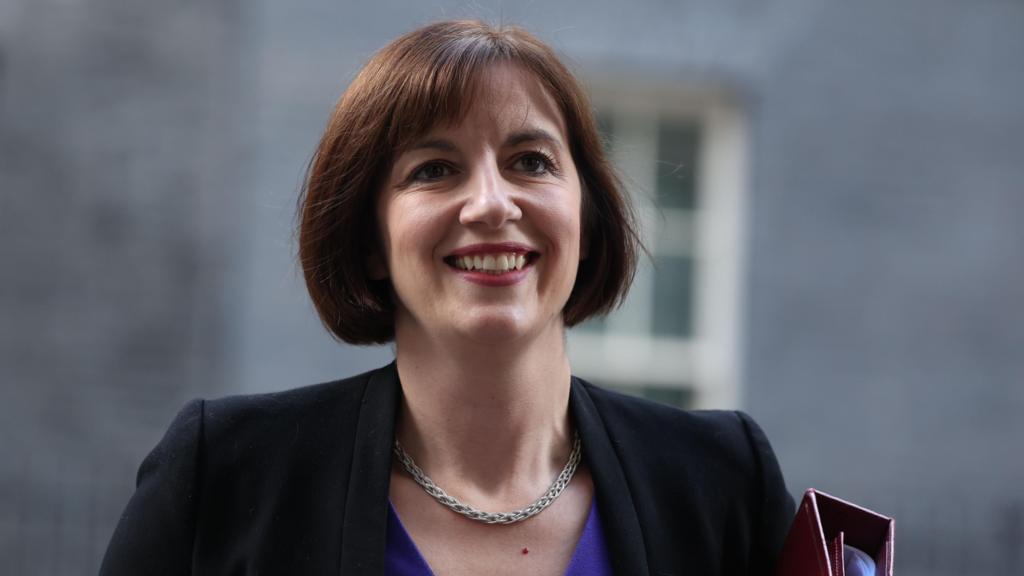“`html
Bridget Phillipson has emerged as an early frontrunner in the Labour deputy leadership contest, securing the necessary support to advance.
The Shadow Education Secretary has garnered endorsements from 116 Labour MPs, exceeding the 80 nominations required to proceed in the election.
According to figures released by the Labour Party, former Commons Leader Lucy Powell remains her closest competitor, having obtained 77 nominations.
Phillipson has established a significant lead over the remaining three candidates, with the deadline for securing sufficient backing set for Thursday.
Bell Ribeiro-Addy has secured 15 nominations, followed by fellow backbencher Paula Barker with 14, while Foreign Affairs Committee Chairwoman Dame Emily Thornberry trails with 13, according to party data.
Housing Minister Alison McGovern previously withdrew from the contest, acknowledging her inability to garner sufficient support and subsequently endorsing Phillipson.
With numerous Labour MPs yet to declare their preferred candidate, there remains the potential for other campaigns to gain traction.
The candidates will have the opportunity to present their platforms to colleagues during a virtual hustings scheduled for Wednesday evening.
The five remaining contenders will convene at party headquarters in south London, with Labour MPs participating remotely to pose questions.
Sir Keir Starmer’s shadow cabinet, comprising 24 MPs, has been instructed not to nominate any candidate, although junior ministers are permitted to do so.
However, some Labour figures speculate that as many as 80 MPs may opt not to officially endorse any candidate, thereby reducing the electorate.
It appears increasingly likely that Phillipson will amass a substantial number of supporters, further constricting the remaining votes up for contention.
As the sole member of the shadow cabinet to declare her candidacy, Phillipson is also anticipated to exhibit greater support for the party leadership compared to some other candidates.
While this may bolster her chances of securing MP nominations, it could prove disadvantageous should the contest proceed to a vote by Labour Party members, particularly if a rival candidate outside of the shadow cabinet emerges.
Discussions among Phillipson’s opponents center on the need for votes to coalesce around a viable alternative, rather than being分散 among multiple candidates.
Several senior Labour figures have advocated for the election of a female deputy leader from northern England, aiming to counter what they perceive as a London-centric and male-dominated party leadership.
Both Sir Keir Starmer and Deputy Prime Minister David Lammy, who succeeded Angela Rayner following her resignation last week, represent London constituencies.
Dame Emily, a London MP, has challenged the notion that the winning candidate should originate from outside the capital, asserting that the focus should be on “what you can do for the party.”
Dame Emily, a member of Sir Keir’s frontbench team during the party’s time in opposition, was unexpectedly excluded from the Prime Minister’s cabinet following Labour’s victory.
Indicating her willingness to challenge the leadership, Dame Emily has pledged to “be a voice for the membership, unions, PLP [Parliamentary Labour Party], and our constituents – not just nod along.”
The expedited timetable for the contest has drawn criticism from some within the party, including Ribeiro-Addy, who suggests it could hinder the progress of left-wing candidates.
While acknowledging the unlikelihood of her victory, Ribeiro-Addy, the MP for Clapham and Brixton Hill, stated her intention to utilize the platform to foster a debate among Labour members regarding “what’s gone wrong” during the party’s initial year in power.
She cited the government’s stance on the conflict in Gaza and proposed benefit cuts as examples.
Fellow candidate Paula Barker has similarly criticized the government’s response to the conflict, and upon launching her campaign called for the party to “go back to our true Labour values”, including to “prioritise people over profit”.
Should candidates secure sufficient support from their parliamentary colleagues, they will then require the backing of either 5% of local parties or three Labour-affiliated groups, including two trade unions.
Those who meet the threshold will face a vote by party members, with the victor announced on October 25th.
Regardless of the outcome, Lammy will remain as Deputy Prime Minister, a role appointed by the Prime Minister rather than decided by Labour Party members.
The contest was initiated following Rayner’s resignation as Deputy Leader, Deputy PM, and Housing Secretary, after admitting to insufficient tax payments during the purchase of a £800,000 flat in Hove.
Sign up for our Politics Essential newsletter to stay informed on Westminster affairs and beyond.
The Tories and some Labour MPs have called for Lord Mandelson to be sacked but Sir Keir has stood by him.
The winning candidate – voted for by Labour members – will be announced on 25 October.
The first woman to hold the role speaks out as the race to replace Angela Rayner gets under way.
The ripple effects of the Angela Rayner saga roll on as six candidates make their pitch for deputy.
The call comes amid fears the bill would be watered down as some of its key backers left the cabinet.
“`

